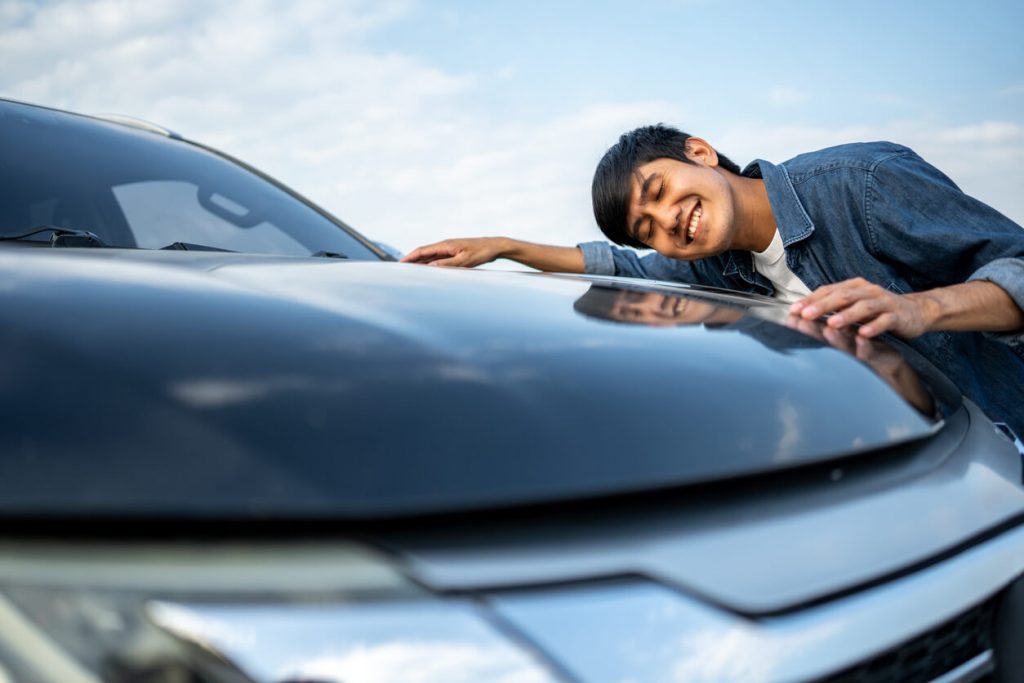Owning a vehicle is a big responsibility, from the financial commitment to the ease of navigating from A to B, many vehicle owners form a deep emotional connection with their vehicles.
According to the Department for Transport there are currently 41.2 million licensed vehicles in the UK, which prompted us to consider how long do people own their vehicles for, what emotions are triggered when they have to part from their cars and what lengths do people go to to make their vehicles part of the family.
To do this, we surveyed 1,000 individuals from the UK to reveal how sentimental they are about the cars they drive.

More than half of Brits have kept a vehicle longer than a partner
Provided it’s well-looked after, the average car can last around 10 years or 200,000 miles, however the older the vehicle gets, the higher the risk of breakdowns and issues. According to our respondents, roughly half of Brits (53%) have kept their vehicles for 4-6 years, with 28% upgrading their vehicle every 1-3 years.
Data from NimbleFins revealed that the average UK driver may spend roughly £3,556 a year to run their vehicle, which means Brits could be £17,780 out of pocket after 5 years.
In light of this we asked whether the average Brit has kept their vehicle longer than a relationship and more than half (57%) said yes they have. Digging deeper into the responses, the data revealed that women were more likely to keep their vehicles longer than a partner with 32% responding yes in comparison to 26% of men.
Although it’s impossible to put an estimate on how long a relationship can last, the average relationship is believed to last 2 years which is 3 years less than the average amount of time vehicle owners hold on to their cars. While research conducted by Novuna Personal Finance revealed that, on average, Brits spend £1,652 on dating every single year, a 115% price difference from owning a car.
However, as it turns out 1 in 4 Brits have actually felt more for a car than they have for a partner, stating that their cars are more “reliable”, “loyal” and a car offers a space to escape, symbolising freedom and independence.
While not everyone may agree that they feel more connected to their car than their partner, 6 in 10 (64%) do in fact view their car as a safe space to escape any problems in their life. Whether people choose to eat their lunch in their vehicles, a place to have some peace and quiet, or a private place to have a phone call, our cars offer more than just transportation. This is evident in the sheer number of TikTok users we see recorded from the front seats of cars.
From favourite road trips to job interviews, our vehicles hold many memories for us with 21% of Brits having first experiences in their cars, including first kisses, dates and first days at new jobs. Other favourite memories include; bringing babies home from hospitals, road trips across the UK and Europe, long drives late at night and family time.
| Most Popular Memories | |
|---|---|
| 1 | First kiss |
| 2 | Driving |
| 3 | Roadtrip |
| 4 | Holidays |
| 5 | Job offer |
| 6 | Beach |
| 7 | Travel |
| 8 | Results |
| 9 | Bringing baby back from hospital |
| 10 | First date |

Betty tops the list as the most popular names for a vehicle
Despite being an inanimate object made of metal and plastic, 6 in 10 Brits name their vehicles. Our emotional connection to our cars elevates their status in our lives as they take us to and from work, shelter us from the weather and hold many memories. It’s no surprise we give them names, personalities and upgraded features.
| Most Popular Car Names | |
|---|---|
| 1 | Betty |
| 2 | Bertie |
| 3 | Betsy |
| 4 | Colin |
| 5 | Baby |
| 6 | Bertha |
| 7 | Bob |
| 8 | Daisy |
| 9 | Fred |
| 10 | Penny |
From the data, Betty ranked first as the most popular name for vehicles, followed by Bertie and Betsy.
When looking for inspiration for names, fictional characters are the main source of inspiration, with almost one in five (19%) Brits claiming their car was named after a favourite character. We saw multiple instances of Batmobiles, Bumblebees, Hercules and even a Gandalf in the study.
Pets are the second leading inspiration for our vehicles, with 13% of Brits naming their mechanic companion after their furry companions.
Over half of Brits hate having to part with their vehicles
Understandably, parting with a vehicle is not an easy task; from the paperwork to saying farewell to the memories, our emotional attachment to our vehicles is evident at the time of saying goodbye.
53% of Brits have had to scrap a vehicle that’s beyond repair, however 6% of respondents stated that the cost of living crisis contributed to them scrapping their vehicle.
As a result, a fifth (20%) of respondents said they felt relieved when they had to say goodbye to their vehicle, with men expressing more relief (22%) than their female counterparts (18%).
However, overwhelmingly 55% of Brits expressed sadness at saying goodbye to their vehicles, particularly their first vehicle with 43% respondents expressing the strongest attachment they felt to this car in particular.
Arguably saying goodbye to your vehicle could also feel like losing a part of yourself with 1 in 3 adults (32%) considering their cars to be an extension of their personality. The study revealed that 42% of Brits customise or modify their vehicles to enhance this, with the most popular additions being accessories (29%), LED lights (25%) and new paint jobs (19%).
But how do we say farewell to the vehicles we love?
Well, it turns out taking a car for one last drive is our favourite way to commemorate our vehicles with 42% of respondents who admitted to commemorating their vehicle doing so. Keeping the number plate (27%) and having a photoshoot with the car (18%) closely followed.
While regular, run-of-the-mill number plates are destroyed with the car as they are linked forever to the vehicle they’re first put onto, private/personalised number plates can be transferred between vehicles.
This is great news for the almost 2 in 5 Brits (38%) who own personalised number plates, who choose to either fully express their personality through their plate (37%), make their vehicle more recognisable (29%), stick to family traditions (16%), or attempt to disguise the age of any vehicle they own (11%).
It may not be simply a case of physically switching them from car A to car B, with paperwork that needs to be completed in order to legally transfer these plates. The V778 Retention Document will give the DVLA all of the information required about the plate that you’re keeping hold of, then will allow the registration to go onto retention, leaving it in your possession.
What do you need to scrap your car?
If you’re looking to find out the scrap value of your car and get rid of your motor in an eco-friendly, efficient and profitable way, then we can help you find a local buyer near you offering top quotes with National Scrap Car’s free price valuation. With your registration number and postcode, we’ll scan our extensive directory of scrap and salvage buyers to find the perfect buyer for you. Plus, we’ll collect your scrap car it at no extra cost – our service is completely free.
Methodology
All data was taken from a survey of 1,000 UK respondents, aged 18+, carried out in November 2023.